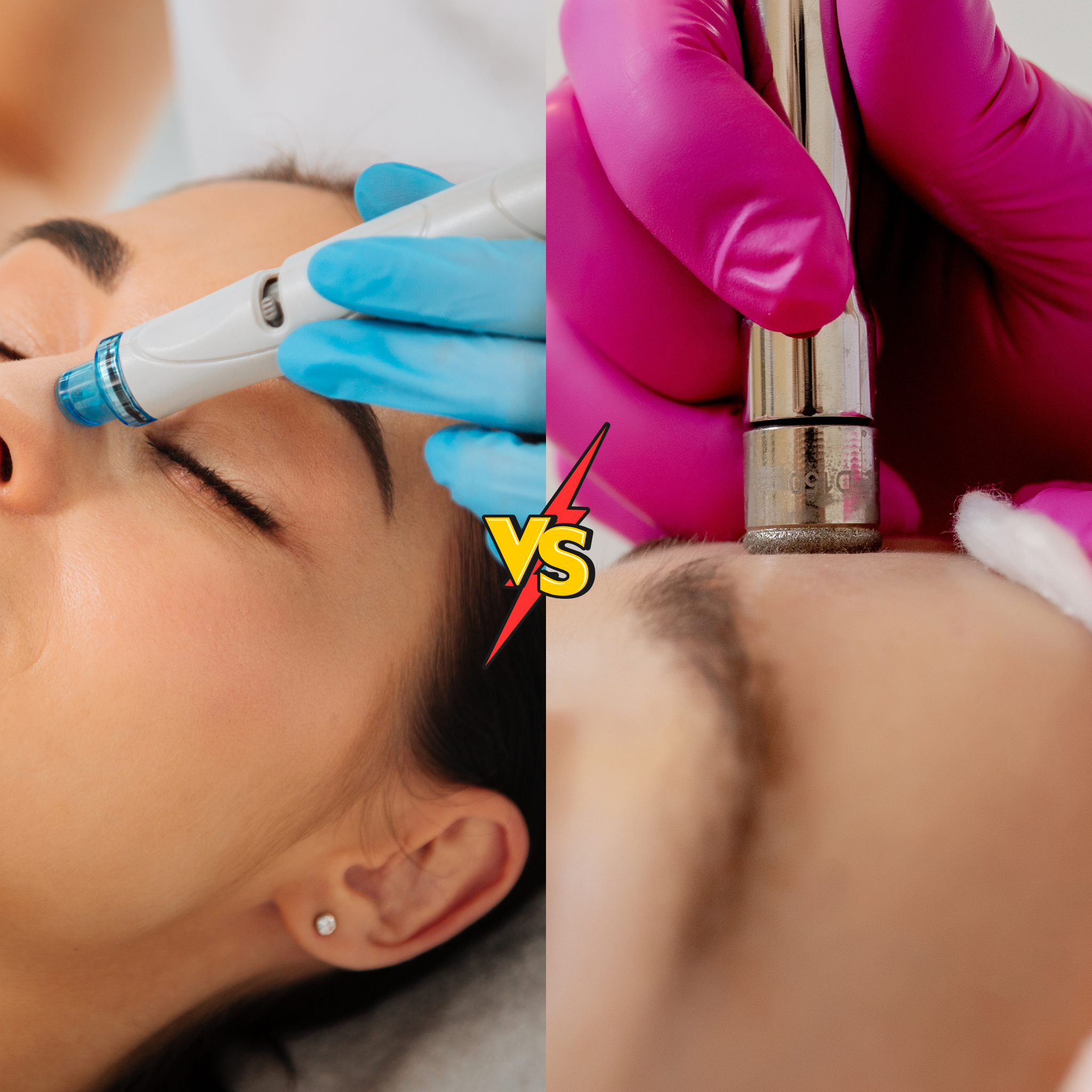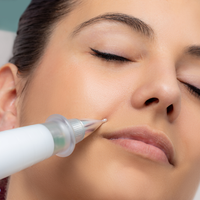Introduction
Do you have dull skin? Are skin care products unable to be absorbed? That's the skin that needs exfoliation! Only by exfoliating dead skin cells and dirt that blocks pores can the skin look brighter and smoother. At present, the two most common non-invasive facial treatments for exfoliation are hydradermabrasion and microdermabrasion. Both of them can help us to remove waste keratin, but the principle adopted is completely different. One uses essence and suction, and the other uses physical friction. This blog will take you through a comprehensive understanding of these two treatments and help you choose the one that suits you best.
What Is Microdermabrasion?
Microdermabrasion gently rubs the face with diamonds or crystal particles. It will simultaneously grind off the outermost layer of dead keratin and dirt on your skin and instantly suck away these wastes with its suction power. Once the old layer is removed, fresh, healthy skin cells gradually grow on the surface to replace it.
The main microdermabrasion benefits include the ability to smooth skin texture and brighten complexion without harsh irritation. It also promotes the production of collagen and elastin, making the skin look firmer and more elastic. After the dead skin on the face has been cleaned up, skin care products can naturally penetrate into the skin to exert the greatest effect. Keep doing it a few times, and you will find that it helps reduce fine lines and wrinkles as well as fade acne marks and scars.
What skin types does it suit? Girls with oily skin and large pores must try it. People with dull skin and thick cuticles can improve skin glow quickly through it. Those with fine lines, acne marks, scars, and other blemishes can also use this method to achieve smoother skin. Surebeauty offers a wide range of microdermabrasion machines for home and salon use. Microdermabrasion at home improves your skin condition without visiting a salon. While professional facial skin rejuvenation machines can bring more loyal clients to beauty salons.
What Is Hydradermabrasion?
Unlike microdermabrasion, hydradermabrasion is carried out under the lubrication of water flow and nourishing serums. First, it will spray out ultra-fine atomized water flow, gently peeling off old keratin and dirt from the skin surface. Immediately after, the vacuum suction force is used to instantly carry away these wastes. After it unclogs pores and leaves the channels fully open, it delivers the nutrient solution straight into the deeper skin layers.
Hydradermabrasion is a gentle treatment that can exfoliate and hydrate skin at the same time. It can not only unclog pores naturally, but also replenish moisture to the skin in time. The hydrating facial treatment works to brighten dull complexion, making skin look fresh and hydrated from within. Because it relies on water flow rather than physical friction, it is very gentle and almost zero stimulation, and the skin is not easy to turn red. Hydradermabrasion benefits dry and sensitive skin by combining deep hydration with gentle cleansing in a single treatment. Its gentle and non-irritating nature also makes it suitable for almost all skin types.
Surebeauty also offers many practical and affordable hydradermabrasion machines. The 2 in 1 hydradermabrasion machine, combining hydradermabrasion and oxygen sprayer, can deeply hydrate and nourish the skin after cleansing the face. The 6 in 1 hydradermabrasion machine, a multifunctional machine that combines six different functions: hydradermabrasion, skin scrubber, hot & cold hammer, bio handle, ultrasonic handle, oxygen sprayer. It allows you to enjoy a variety of different skin care experiences with just one machine and helps solve various skin problems.
Key Differences Between Hydradermabrasion and Microdermabrasion
These two treatments sound very similar and both benefit anti-aging skincare by improving texture, but they're actually quite different. Next, we will take you to make it clear once!
l Technique: Microdermabrasion removes dead skin on the skin surface by physical friction, and the exfoliation effect is more direct. Hydradermabrasion uses atomized water flow combined with vacuum suction to exfoliate and hydrate the skin. One is dry polishing and the other is wet cleaning.
l Skin Types: Microdermabrasion is more suitable for people with oily skin, coarse pores, and rough skin, and the skin should have a certain tolerance. Hydradermabrasion has a wider range of applications and is perfect for almost all skin types, from dry skin, normal skin, oily skin, to sensitive skin.
l Results: Hydradermabrasion vs microdermabrasion, which gives faster visible results? The answer is hydradermabrasion. It acts as a hydrating facial treatment, making your skin feel fresher and brighter instantly. It is especially suitable for emergency improvement of skin condition. As for Microdermabrasion, it takes longer and more courses of treatment to see the obvious improvement of skin texture, because it takes some time for new skin cells to grow.
l Comfort Level: Microdermabrasion will make people feel obviously polished, which may be slightly irritating to people with low skin tolerance. Hydradermabrasion is a gentle exfoliation facial treatment with extremely low irritation. Most people feel that it is like doing a spa.
l Downtime & Aftercare: Want to put on makeup right after the treatment? Hydradermabrasion makes that possible. It's very gentle and has almost no downtime. Microdermabrasion may be more irritating to the skin and requires some recovery time. After the treatment, you have to take gentle care of your skin and avoid any activities that may cause irritation.
l Treatment Frequency: Microdermabrasion recommends every 3 to 4 weeks, preferring periodic improvement treatment. Hydradermabrasion can be used every 2 weeks for daily deep cleaning and maintenance.
Which Facial Should You Choose?
Microdermabrasion and hydradermabrasion in professional skincare treatments can both help brighten the complexion and improve skin texture. How to choose between microdermabrasion and hydradermabrasion? It is easy to make a decision from two aspects: skin condition and treatment goal. Microdermabrasion is suitable for oily, rough and slightly flawed skin. It can effectively improve skin texture and make skin more delicate and smooth. Hydradermabrasion has the effect of hydrating and is very friendly to dry skin and sensitive skin. It moisturizes the skin while cleansing, making the skin moist and glowing immediately.
Can they be used alternately or in combination? Of course. Some beauty salons offer zoned care, such as using microdermabrasion on areas with excessive oil secretion and hydradermabrasion on dry and sensitive areas. You can also use microdermabrasion to exfoliate first and hydradermabrasion to hydrate and repair next time. Combining them creates an effective professional skincare treatment for youthful, radiant skin.







0 comments